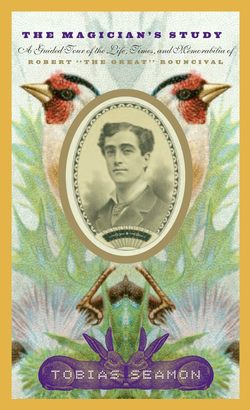Читать книгу The Magician's Study - Tobias Seamon - Страница 11
На сайте Литреса книга снята с продажи.
ОглавлениеTHE Orphan Timepiece
Just a short walk now, thankfully far less than Robert’s return to America. Though we don’t have time, you see there that framed newspaper print? It is from a now-defunct New York daily and the first-ever review of Robert’s show. It is a pan, and Robert, perhaps infected with the hot temper of the Latin world, challenged the reporter to a duel in Central Park’s Sheep Meadow. Luckily for Robert, the newspaperman did not appear at the scheduled appointment. Most assuredly, the intrepid reporter would have perished in that meadow, either by Robert’s hand or, more likely, by Sherpa’s.
But before Robert’s act can receive its first poor mention, it must take the stage, and that took a bit of doing. Rouncival and Sherpa, perhaps through one of Sherpa’s old Caribbean acquaintances, returned to America via the seas, arriving at New York Harbor in May of 1921. Disgusted with Prohibition, as well supposedly with the success of the women’s suffrage movement, Robert wished to see his home and family. Taking a Spanish molasses barge up the Hudson River, which Robert later claimed was called The Dolorosa, the friends arrived at Kingston only to discover the death of Robert’s mother, Elaine Rouncival. In his absence, she had died during the Spanish influenza epidemic. It was Robert’s second funereal homecoming in as many trips, and the effect upon him was grim. Though gladdened to see his father, Robert took to the taverns yet again for an extended period, Sherpa at his side, and the summer was spent in hollow-chested debauchery. They did assist Mr. Rouncival, whose eyesight was failing quickly, with his watch repairs, which Sherpa was fascinated by.
On the whole, however, the return to Kingston was a disaster. Unable to give up their rough, waterfront ways, Robert and Sherpa could be found most evenings in the illegal saloons around the riverside Roundout area of town. There, as usual, they drank and brawled, with the Kingston toughs taking no degree of delight in picking quarrels with Sherpa. The town’s distrust of the two wild foreigners—and make no mistake: Robert was by now a very foreign entity—was such that he and Sherpa were regarded as thieves, Bolsheviks, homosexuals, or a combination of all three. That the young women of the village found the two wild men enticing only exasperated matters with the local ruffians. Even dour Robert realized the situation was untenable, and by late October he told his father they were off again, this time to New York City. He’d been practicing various routines with Sherpa and felt it was time to make their fortune.
The evening before their departure, Thomas Rouncival presented his son with a gift: a pocket watch and fob made entirely from used, discarded, or otherwise orphaned parts accumulated throughout the years. Robert called the watch “my most hideous, tormented, treasured possession,” and it can be found right here, in my vest pocket. As you can see, it is indeed a timepiece of odd appearance, though most skillfully made. What you cannot see is that inscribed upon the back are the simple words, For My Son. Thomas Rouncival, who’d also given Sherpa a small folding pouch of watch-repairing tools, died of pneumonia in February the following year. When he received the news, Robert told Sherpa, “Going home to yet another death will kill me as well.” Robert did not return to Kingston for the funeral, or ever again for that matter, and he immediately sold the house and the shop at the back, his entire inheritance, for far less than its worth.
